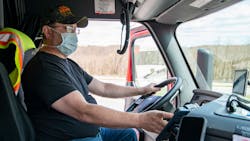Post-COVID, workforce shortages will again be an issue
COVID-19 has resulted in 50 million Americans filing for unemployment— a number that is higher than the 37 million who filed during the Great Recession. In June, the unemployment level “fell” to 11.1%, but as you may recall, prior to the pandemic, unemployment numbers were hovering at the 4% level.
The trucking industry, while touted as an essential industry and commended for its efforts by the President of the United States, was impacted by the economic shutdown and saw its fair share of job losses as well.
For years prior to 2020, nearly everyone in the trucking industry bemoaned the shortage of drivers and technicians. With the economic downturn it may appear at face value that we have solved the problem simply because unemployment levels are so high. However, my concern is for the long term. While COVID-19 may have given us a reprieve from the people shortage, the industry as a whole has not addressed any of the fundamental issues with attracting and retaining people.
When the U.S. economy gets humming again, we are going to be back in the same boat, scrambling to find employees or turning down business because we can’t find enough people who want to drive trucks, turn wrenches, dispatch drivers, or find the right parts.
During the early stages of the pandemic, for a moment, truckers regained their “knights of the highway” status and were seen as heroes because they were delivering essential goods. But as the supply chain did what it has always done, and supplies became plentiful we stopped hearing about drivers as heroes.
Pandemic or not, trucking is an essential part of our economy. If we want to be able to attract people to trucking as the economy works its way back, we need to get back to looking at some of the fundamental issues including the way we talk about trucking jobs, the types of people we focus our recruiting efforts on, the way we pay people and the overall working conditions the new generation desires and expects.
The “old school” trucking industry is a thing of the past. We are a tech enabled global supply chain that transports, pharmaceuticals, food, clothing, building materials and every other essential that the population needs and wants. We are a very diverse industry that embraces all races and ethnicities.
As we move into the age of electrified and autonomous vehicles, we will need more and more tech savvy personnel that can maximize the ROI on these new vehicles and systems. We need to step up our current training programs and promote the “new school” trucking industry that is here to compete.
Trucking has afforded many of us great opportunities, yet how many of us talk about what a great industry this is when we have a chance to speak with young people? If we are not ambassadors for our own industry, who will be?
COVID-19 may have served to mask the people shortage in trucking, but don’t be lulled into thinking the problem has gone away for good. Act now to start changing the things you can in order to make this industry a place where all sorts of people want to work.
About the Author

Patrick Gaskins
Senior vice president, Fleet Solutions
Pat Gaskins is the senior vice president of Corcentric Fleet Solutions, where he leads both the sales and operations teams for the company’s fleet offerings. He has over 30 years of experience as a financial services professional in the transportation industry and manages partnerships with over 160 manufacturers, helping over 2,000 of the country’s largest fleets manage all aspects of their fleet operations and fleet-related spend.
